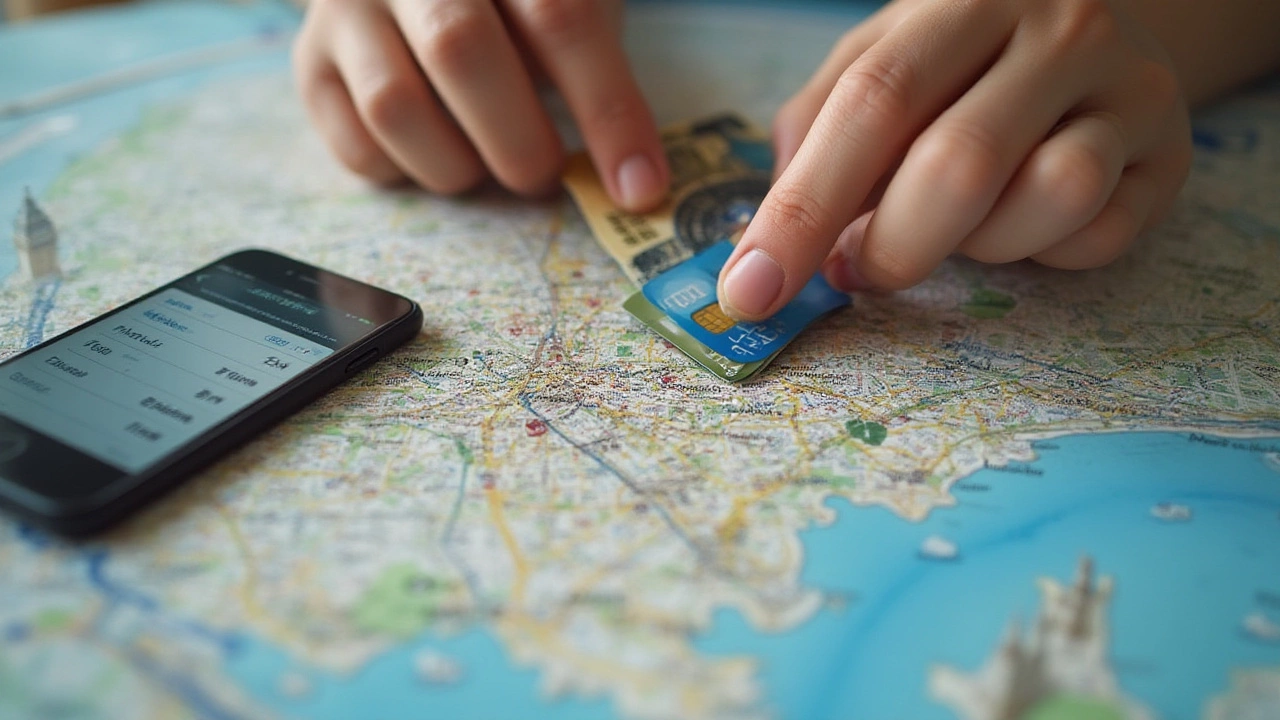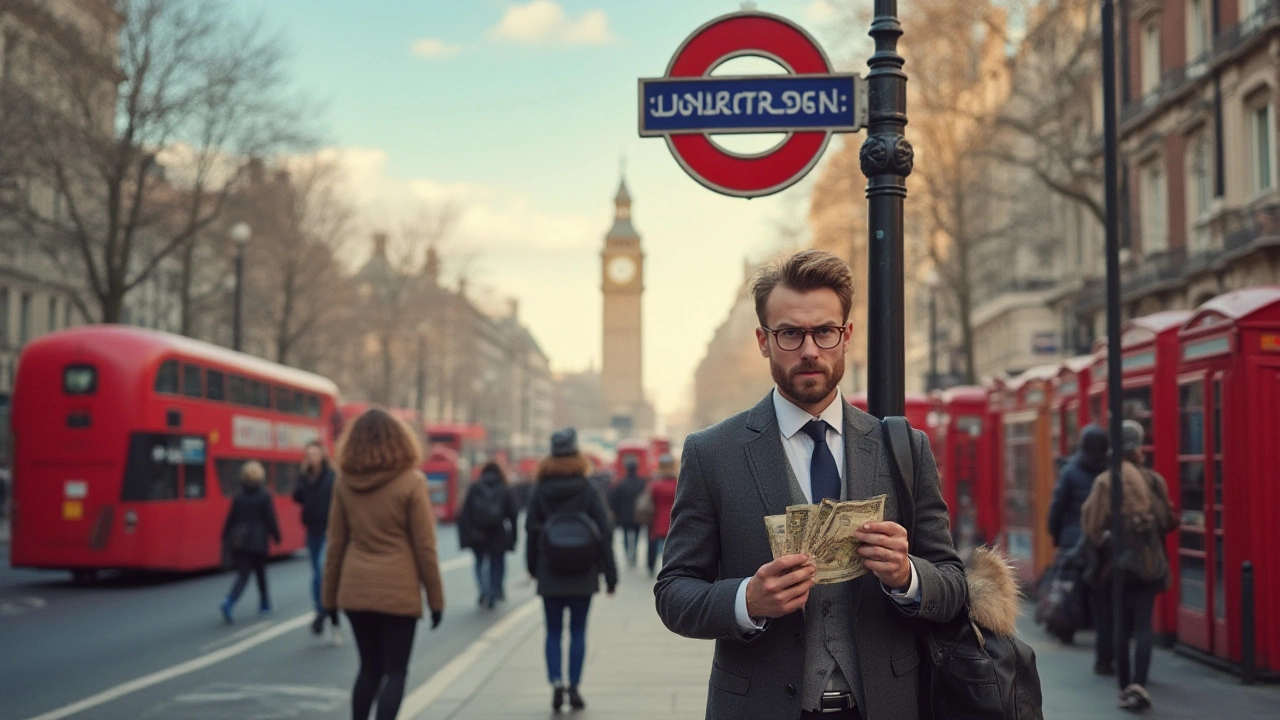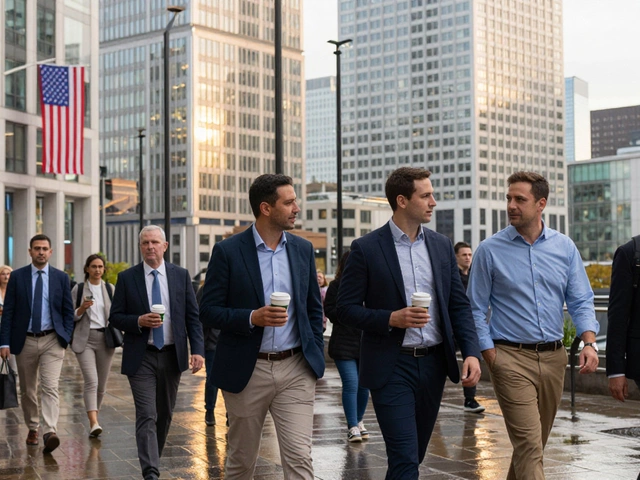Picture this: your flight to London is in just a few days, your suitcase is begging to be packed, and you suddenly wonder, 'Wait, do I need to get pounds before I step off the plane?' It’s one of those things you don’t hear much about until it’s almost too late. The thought of hunting for an ATM in a jetlagged fog or getting fleeced at an airport currency booth is enough to make anyone second-guess their plans. Here’s where it gets interesting: Whether you should exchange money before your trip isn’t as straightforward as you think. There’s advice swirling around everywhere—some say yes, load up on pounds before you go, others swear by using your cards. Let’s break it all down so your first moments in London are about Paddington Bear and pub lunches, not frantically trying to pay for a taxi with the wrong currency.
Understanding Currency Needs in Modern London
Step into central London and you’ll see contactless payment as the reigning monarch. Shops, restaurants, buskers selling CDs on the street—just about everyone accepts cards and digital wallets. In a 2024 survey from UK Finance, 90% of in-store transactions in London were contactless, mostly using debit cards and smartphones. Even the London Underground doesn’t expect paper tickets anymore. Want to get on the Tube? Just tap your card or phone. Cash is still accepted, but locals and tourists alike often go days or weeks at a time without handling a single note. But here’s the twist: while life in London is a contactless paradise, that isn’t always the case in every neighborhood or for every tiny vendor. Markets in Camden or a street food stall in Borough Market might be cash-only or have a minimum card spend. If you plan to tip a street performer, pay a luggage porter at your hotel, or split a bill in a tiny ramen joint, having a few pounds in your wallet can be a lifesaver.
Let’s look at the numbers. According to the Bank of England, cash accounted for only 10% of all payments in 2024, down from 25% just five years prior. But, and this is crucial, the number of cash-only businesses hasn’t dropped to zero. For example, some taxi drivers or independent market sellers may avoid card payment fees and prefer cash. If you’re traveling from somewhere where using plastic is the norm, London’s mix of ultra-digital and stubbornly old-school can be a surprise. So should you land at Heathrow with a fat stack of twenty-pound notes, or none at all? Keep reading.
Pros and Cons of Exchanging Money Before You Arrive
There’s something nostalgic—and faintly glamorous—about flipping fresh banknotes at the airport. For the practical traveler, it can bring peace of mind. If you grab pounds before your flight, you won’t have to hunt for an ATM, worry about your bank card being blocked, or fumble with exchange rates while you’re half asleep. It also means you can react quickly to sudden expenses: tipping a taxi driver at 5 a.m., grabbing a bottle of water, or paying for a public restroom (yes, some still charge 20p or 50p coins for entry, especially at train stations or parks—true story, I once found myself digging desperately through my backpack at Victoria Station because my contactless card didn’t work on the toilet turnstile!). Kids, lesson learned.
But grabbing pounds before a trip comes at a price—not just tourist nerves. Banks and currency kiosks in your home country rarely offer the best exchange rates. They have to move huge amounts of foreign cash, so they charge hefty margins and sometimes extra fees. On average, rates at American banks can be 2-3% worse than the actual exchange rate, compared to rates you’ll often find when withdrawing pounds from a bank ATM in London. It can add up—if you exchange $500, you could lose $10-15 to bad rates and more to the flat fees. And if you overestimate and bring too much, you’re stuck with leftover pounds on your way home, needing to swap them back at even more disadvantageous rates.
Yet, if you’re arriving late at night, heading straight to a remote village, or your card sometimes decides it hates foreign purchases (been there), keeping £50-£100 in cash can be a stress-buster. You won’t need much, just enough for the first few meals, tipping, and emergencies; but it’ll help you relax right as you land. Grab that cash before you leave, but never more than you’re happy to tuck away for backup.

Best Ways to Get Pounds in London: ATMs, Exchange Offices, and Cards
Let’s settle one thing: airport currency exchange booths rarely do you any favors. Their exchange rates are some of the worst you’ll find—not just in London, but everywhere around the world. A classic rookie mistake is heading straight to the bright yellow booth at arrivals out of convenience. On July 10, 2025, for example, the official interbank exchange rate was £1 = $1.25, but Heathrow booths were offering as low as £1 = $1.36 once you count their commissions. It hurts. ATMs inside the airport often use the direct market rate but watch out—they can still have fees, especially if they’re not attached to a UK bank branch. That’s why I usually wait until I’m outside, hunt for an HSBC or Barclays on the high street, and draw cash there.
Your own bank’s card fees matter, too. Some cards charge foreign transaction fees (1-3%) for every purchase or cash withdrawal. Others, especially the travel-focused ones, don’t charge extra and even reimburse ATM fees. My partner, Derek, swears by his Revolut card, while I’m a big fan of my Capital One, both of which have saved us from dozens of nasty surprise charges over the years. Before you travel, check your bank’s foreign fees and let them know you’ll be using your card abroad. If you do need to withdraw cash, choose 'Without Conversion' at the ATM—you’ll get a better rate because your home bank will handle the conversion, not the ATM owner.
| Method | Typical Fees | Exchange Rate | Speed & Convenience |
|---|---|---|---|
| Home Bank or Airport Kiosk | 2-5% markup, plus fees | Poor | Instant, but expensive |
| ATM in London (UK major bank) | 0-3% bank fee, possible ATM fee | Good-interbank rate | Easy to find, quick |
| Prepaid Travel Card | Varies, often no fees | Excellent if you pre-load at right time | Very convenient |
| Traditional Credit/Debit Card | 1-3% foreign transaction fee | Fair to good | Super easy, accepted almost everywhere |
For bigger buys—a train ticket, your hotel, sightseeing passes—swipe your plastic and tap your phone. If a shop ever asks whether you want to pay in pounds or your home currency, always pick pounds. Dynamic currency conversion (DCC) is a notorious trick that adds another hidden fee. I once agreed to pay in dollars at a Covent Garden gift shop and kicking myself afterwards when I saw the inflated charge. Lesson learned: When in doubt, pay in pounds, always.
How Much Cash Should You Really Carry in London?
London is expensive; there’s no sugar-coating it. But don’t let sticker shock scare you into withdrawing more cash than you’d ever reasonably spend. For most visitors, £100–£150 in cash will last a week in the city, covering small purchases, markets, or emergencies. To put it into perspective, the average cost of a coffee is £4, a Tube ride-zoned at £2.80, and a budget lunch at Pret or Greggs is under £8. You’ll probably end up paying for most meals, tours, museums, and even public toilets with your phone or card, so don’t stress about not carrying hundreds in cash.
Here are my favorite occasions to have a few notes or coins:
- Paying for takeaway food at small vendors—think a salt beef bagel in Brick Lane late at night.
- Leaving tips for hotel or taxi staff who don’t have a card tip option.
- Shopping at little vintage stores or markets that love hard-earned cash.
- Emergency public bathrooms, especially at train stations and parks.
- Buying quirky souvenirs or snacks at a local car boot sale.
If you don’t want the hassle of worrying about coins or leftover foreign bills, just stick with your cards. Apps like Google Pay, Apple Pay, even PayPal—all widely accepted across London. But for those 'off the beaten path' moments, having a tenner in your pocket can save the day. The great thing? If you miscalculate and end up needing more, there are ATMs everywhere—across Oxford Street, tucked inside museums, even at late-night convenience stores.

Travel Tips: Getting the Most from Your Currency in London
Smart travelers squeeze every penny—quite literally. Keep these tips handy to make your money stretch just a touch further:
- Before you fly, call your bank and your card issuer. Tell them you’re heading to London—there’s nothing worse than having your card locked for “suspicious” activity your first night overseas (ask Derek about his blocked card fiasco at midnight!).
- Double-check whether your cards charge a foreign transaction fee. If you’ve got a no-fee card, use it!
- For cash withdrawals, only use ATMs operated by actual banks (HSBC, Barclays, Lloyds, NatWest)—avoid stand-alone machines in shops or hotels, which often add extra fees.
- If you exchange money, never do it at the airport unless you absolutely have to—the rates there are famously bad.
- Download your bank’s mobile app to track spending, spot fraud, and manage balances easily on the go.
- Carry a small pouch or ziplock for coins. You’ll be amazed how fast British coins add up, especially with the quirky £2 and 50p designs floating around.
- Grab a souvenir £5 or £10 note with the Queen or King on it for your scrapbook (or to impress friends back home who still think people use cheques in the UK).
- If you’re coming from the EU, know your currency—euros are almost never accepted in shops or restaurants, so don’t count on using them.
- For longer stays, consider a UK-based digital bank account (Monzo, Starling, Revolut). They’re free to open, easy to top up, and make day-to-day payments seamless.
- If traveling in a group, split purchases using apps like Splitwise or Monzo's Group Tab, which makes settling London coffees or cab fares hilarious and painless.
London’s money scene is modern, casual, and—dare I say it?—surprisingly hassle-free for travelers who are prepared. You don’t need to carry a wad of pounds, nor do you want to land cashless. With smart planning, you’ll spend more time soaking up London’s theater scene and sipping pints by the River Thames—and less time sweating over exchange rates or surprise fees.





